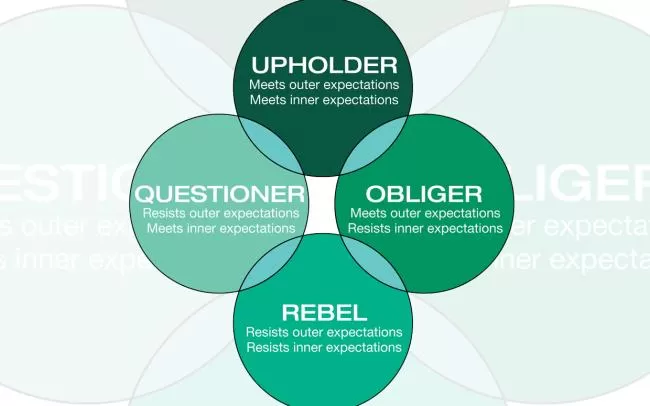
Gretchen Rubin is the author of Better Than Before, a book about creating and maintaining habits. While writing this book, she created four categories of personality as a framework to help explain how individuals respond to both external and internal rules. The Four Tendencies describe how people respond to expectations, including outer expectations (i.e. a deadline, a request from a friend) as well as inner expectations (i.e. starting that new diet, or keeping a New Year’s resolution). Your response to these expectations is what defines your type. According to a blog post by Rubin on Psychology Today, she defined the Four Tendencies accordingly:
UPHOLDERS wake up and think, “What’s on the schedule and the to-do list for today?” They’re very motivated by execution, getting things accomplished. They really don’t like making mistakes, getting blamed, or failing to follow through (including doing so to themselves). They response readily to outer and inner expectations.
QUESTIONERS wake up and think, “What needs to get done today?” They’re very motivated by seeing good reasons for a particular course of action. They really don’t like spending time and effort on activities they don’t agree with. They will meet an expectation if they think it makes sense (often after asking a lot of questions about it) so they make everything an inner expectation.
REBELS wake up and think, “What do I want to do today?” They’re very motivated by a sense of freedom, of self-determination. (I used to think that Rebels were energizing by flouting rules, but I now I suspect that that’s a by-product of their desire to determine their own course of action. Though they do seem to enjoy flouting rules.) They really don’t like being told what to do. They resist all expectations, outer and inner alike.
OBLIGERS wake up and think, “What must I do today?” They’re very motivated by accountability. They really don’t like being reprimanded or letting others down. They readily meet outer expectations, but struggle to meet inner expectations they impose on themselves.
Curious to know what your type is? Well, you can take the quiz to find out at Rubin’s website here. Understanding your tendency can be important if you are trying to change a habit or find a new means of motivation that will be more productive for you. For example, an Obliger who is finding a hard time exercising on their own might need to set up a mechanism for external accountability, since they will respond better to that. It might be in that Obliger’s best interest to join a workout class or a running club.
This can also be an interesting framework to examine if you want to know how another person will consider and act upon a request or order from you. It can also help explain the behavior of others. Perhaps you find yourself exasperated when a co-worker questions every action or decision. Perhaps they are a Questioner and that is their modus operandi.




